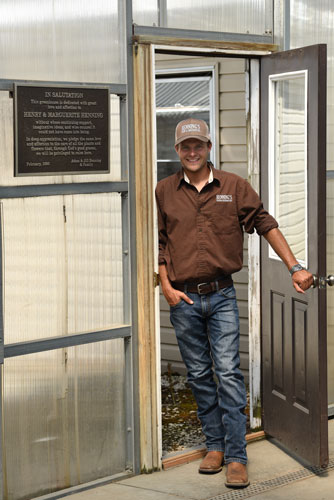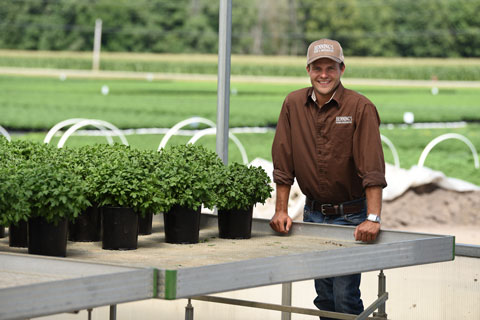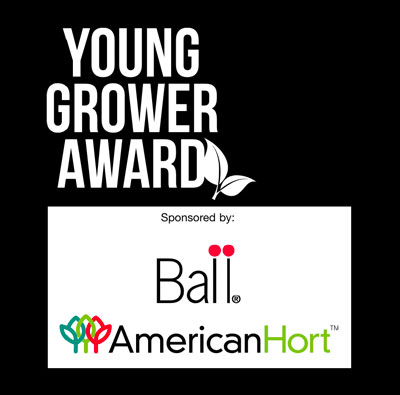9/1/2022
Wise Beyond His Years
Jennifer Zurko
Photography by Mark Widhalm

The saying, “Born into the business,” is an understatement for Quinten Henning.
He’s the fourth generation at Henning’s Farm & Greenhouses, working toward becoming the sole owner of the family business someday.
His first memories are of the farm as he grew up among the fields and greenhouses. And he had true on-the-job training, working simple jobs when he was in middle school and continuing until he graduated from high school and started taking over the business.
And all by the ripe old age of 23.
A legacy of go-getters
Quinten’s heritage is deeply rooted in flowers. His great-grandfather Ralph Fisher opened a flower shop and greenhouse in Brooklyn, New York, in the early 1900s after immigrating to the U.S. from Germany. When it was time to hand over the business to the next generation, Ralph gave it to his oldest son, even though Quinten’s grandmother Marguerite showed much more of an interest in running the shop. But it was the late 1940s and running a business wasn’t women’s work.
Regardless, Marguerite wasn’t deterred, so she moved to Long Island and opened her own flower shop, first in the town of Merrick, then to Somerset, New Jersey, to a bigger place that had greenhouses where they could grow their own plants.
Quinten’s father Adam is the youngest of Marguerite’s six boys, so when it was time for her to pass the business along, Adam’s older brothers got first dibs. So like his mother before him, Adam ventured out to open his own growing business. Quinten’s mother Jill is from Valparaiso, Indiana, so when she and Adam were looking for a farm they found one in DeMotte, which was close to her family. The Hennings bought the property from a vegetable grower who was looking to retire and Henning’s Farm & Greenhouses has been operating as a wholesale ornamentals operation and row crop farm in DeMotte since 1987.
Quinten himself is the youngest, and only boy, of four children. When his parents bought the farm, it came with a small farmhouse where Quinten was born. From there, it was a natural progression into the family business.
“Starting out originally, it was more like I was just a little kid running around, so half of the memories are of me running around on the four-wheeler,” said Quinten. “Once I started working, it was more because I wanted to help out.”
Quinten started getting his first paychecks for the work he was doing on the farm when he was around 12 years old. He helped with the corn and soybeans, but also found himself in the greenhouses more and more, pinching cuttings, transplanting or watering. As those things became second nature to him, more responsibilities were added. By the time he was a senior in high school, he was working full time at the farm while going to school.
High school graduation presented Quinten with a conundrum—attend college or join the family business and become a permanent partner?
“I wanted to go [to college]—I felt like I would really miss out on the experience and I that I had my entire life to work. I didn’t want to rush into it,” explained Quinten. “But, at the same time, I couldn’t pencil out going and spending all of this money on a degree just to go and get a job that I already had.”
Keeping the dynasty going
Quinten decided to help his dad and joined the business. He’s quick to point out that he always knew that he’d be a part of Henning’s; that was his plan all along and he never felt the pressure to do so. But as anyone who works with their family knows, running a business alongside the same people you work and live with can be challenging.
“There’s a lot of times where it’s peak season and you’re getting burned out a little bit. You don’t necessarily want to hang out with each other because you’ve been with that person nonstop for weeks, so that can be hard,” Quinten admitted. “The other thing that can be hard is making decisions together. But, luckily, my dad and I have always been on the same page. We might have slightly different ideas, but usually they’re pretty darn close where we can compromise easily. For some reason, we’ve just been able to be great partners. We’ve had disagreements, but I think that’s normal with any family.”
 But one of the perks of having your name on the company is that there’s more leeway to be creative and take more risks.
But one of the perks of having your name on the company is that there’s more leeway to be creative and take more risks.
“I definitely make decisions that I wouldn’t make if I didn’t have my name on it,” said Quinten. “There are so many rewards to [being a family business]. The pros definitely outweigh the cons.”
Currently, Henning’s has 310 acres of corn and soybean production on the farm side of the business. For the ornamentals side, they have 50,000 sq. ft. of greenhouse with 15 acres of outdoor mum production. Mums are Henning’s claim to fame, producing 180,000 units for landscapers who come from northern and central Indiana, and the Chicago-land area. (DeMotte is only about an hour and a half drive from Chicago.)
In the spring, they produce annuals for their retail and grocery store customers, and for a local farmers market. They’ve even started a small pop-up retail area on the property that one of Quinten’s sisters runs part-time, but it’s only about 5% of the business.
Quinten’s formal title is Vice President, and he and his dad have a formal succession plan that allows him to continue to learn and grow in the business, while strengthening it for the long haul. Since he started working at Henning’s full time, Adam has given 2% of his shares to Quinten every year. This will continue until Adam is ready to fully retire and gives the entire operation over to Quinten.
“Now that I’ve started taking over, we’re planning for the future,” said Quinten. “We’re planning long term and when something needs to be fixed, we fix it right. We’re investing back into the business rather than thinking this might just be for a couple more years.”
Since Quinten is now a partner in the farm, Adam has been able to dabble in other business ventures, including investing in other farmland and rental properties. (Quinten even recently bought his first duplex property, as well.) Quinten said that his dad’s plan is to build a separate means for him to live off of when he retires from the growing business.
“If there comes a time where he can’t work anymore, I’m not going to have to buy the business from him and I’m not going to have to pay him rent or a mortgage,” said Quinten. “He didn’t want me to take over the business and then have to buy him or somebody else out. In the last couple of years, we’ve really tried to become debt-free, too, and settle up all of our debt so that if something does happen where I’m thrown into it by myself without him, I won’t have to worry about making a big payment.”
Another way Adam is preparing Quinten for taking over the farm is he made it a point to make sure Quinten knew every aspect of operating a hort/ag business—from operations to growing to maintenance to management. Quinten said he’s got a long list of responsibilities and could work 365 days a year and never run out of work to do on the farm. But running a family business takes a lot of dedication and attention to detail, so it’s worth putting in the work to be better prepared for anything.
“He doesn’t want me to just place the orders or to just do the growing or to just manage the crew—he wants me to be able to do every single job and I have done that,” said Quinten. “We’ve seen where sometimes kids go into the family business and one of the parents passes away or unexpectedly isn’t able to work anymore, and those kids don’t know how to handle other parts of the business. A lot of times those businesses fail. You never know when something can happen.”
The little things
As with a lot of growing operations in our industry, Henning’s has had a hard time getting labor during peak times. In the short term, Quinten hopes to be able to get more help so that he isn’t forced to cut back his production and his small crew doesn’t burn out. They’re also working toward upgrading their equipment so that they’re operating as efficiently as possible.
Quinten’s long-term goal is to keep Henning’s sustainable and successful so that he can pass along a healthy business to the next generation, just like his dad is doing. But this doesn’t necessarily mean he wants to expand beyond their means.
“I don’t know if I necessarily have a goal like, I want to grow this many mums or I want to do this much in sales. I just really want to try and be more efficient, streamline our products and our sales, and try to work with good customers,” said Quinten. “I don’t want to be in a position where I put up a bunch of greenhouses and I have to fill them up to make the payments so I have to take orders from anybody that will give me one or cut down my margins.
“I would rather be smaller, hands-on, and do a really nice job and work with a few really good customers rather than make it a numbers game.”
The pandemic years were good for Henning’s—Quinten said they decided to “swing for the fence and grow as much as we could possibly grow,” double and triple cropping spring annuals, then rolling right into mum production. With the shortage of labor, it’s been difficult to keep up, but Quinten’s positive, can-do attitude will be helpful as he juggles this problem that he just considers part of the game of growing.
“One of the things that really drives me is when I see a landscape bed or a garden center and I can pick out my products and confidently say that mine look the best,” he said. “I’d rather make a little less money and have a better product. I like putting everything I can into the crop and knocking it out of the park with quality.”
 Since Henning’s doesn’t grow poinsettias, they close for a few months after mum season, which gives Quinten more time to spend with his girlfriend Morgan and his dog Honey, hunting, fishing and just enjoying the outdoors. But don’t think he ever truly takes a day off—Quinten was born into hard work. Solving problems and figuring out ways to make Henning’s better is in his blood. And also to keep learning all that he can. He is only 23 years old, after all.
Since Henning’s doesn’t grow poinsettias, they close for a few months after mum season, which gives Quinten more time to spend with his girlfriend Morgan and his dog Honey, hunting, fishing and just enjoying the outdoors. But don’t think he ever truly takes a day off—Quinten was born into hard work. Solving problems and figuring out ways to make Henning’s better is in his blood. And also to keep learning all that he can. He is only 23 years old, after all.
“There’s a lot to be said about working on a farm; there are little things that you can’t really explain,” said Quinten. “The smell of the mums in the fall—not a lot of people know what that smell is. Planting a seed and watching it grow and seeing what it turns into. Plants are so amazing and I’m always learning something new about them.” GT